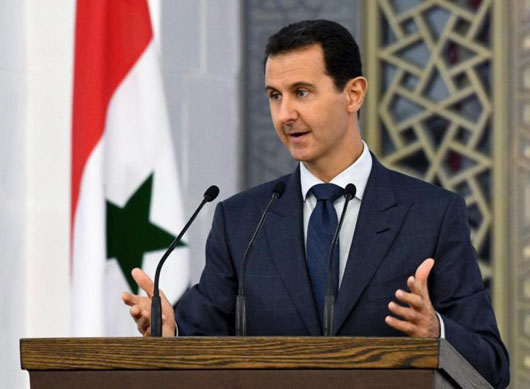by WorldTribune Staff, August 21, 2017
Syrian President Bashar Assad said he was grateful to Russia, Iran and Iran-backed Hizbullah for helping him survive attempts from the West to overthrow him.
“Their direct support – politically, economically, and militarily – has made possible bigger advances on the battlefield and reduced the losses and burdens of war,” Assad said during a televised address on Aug. 20.

Assad also told members of Syria’s diplomatic corps on Aug. 20 that his government had “defeated the Western plans (against Syria) but that doesn’t mean that we have won, the battle continues.”
The Syrian leader said his country should no longer look to the West but rather “turn politically, economically and culturally to the east,” in reference to the government’s remaining allies.
He also admonished Syria’s neighbor to the north, saying “We consider Turkey to be neither a partner nor a guarantor and we do not trust it.”
Assad described Turkish President Recep Tayyip Erdogan as a “political beggar, who seeks to give himself any role.”
Erdogan has been openly critical of Assad and has several times called on the Syrian leader to resign.
Last year, however, Turkey appeared to soften its stance on Syria, with Turkish Prime Minister Binali Yildirim saying his country is willing to accept a role for Assad during a transitional period.
For countries that are considering reopening embassies in Damascus or resuming ties with his government, Assad they must end their support for Syrian rebels.
“We are not isolated like they think, it’s their arrogance that pushes them to think in this manner,” Assad said.
“There will be neither security cooperation, nor the opening of embassies, nor a role for certain states that say they want to find a way out (of Syria’s war), unless they explicitly cut their ties with terrorism.”
Syria’s government refers to all those who oppose it as “terrorists,” including both jihadist rebels as well as rebels considered by the West to be “moderate.”
Reports have indicated that Western countries could be seeking to quietly resume ties with Syria, including France under new President Emmanuel Macron.
Assad was also critical of U.S. proposals for “safe zones” in Syria, which U.S. President Donald Trump earlier this year hoped to develop in a joint initiative with Moscow.
Such zones, Assad said, would only “give cover to terrorists.”
Subscribe to Geostrategy-Direct __________ Support Free Press Foundation
